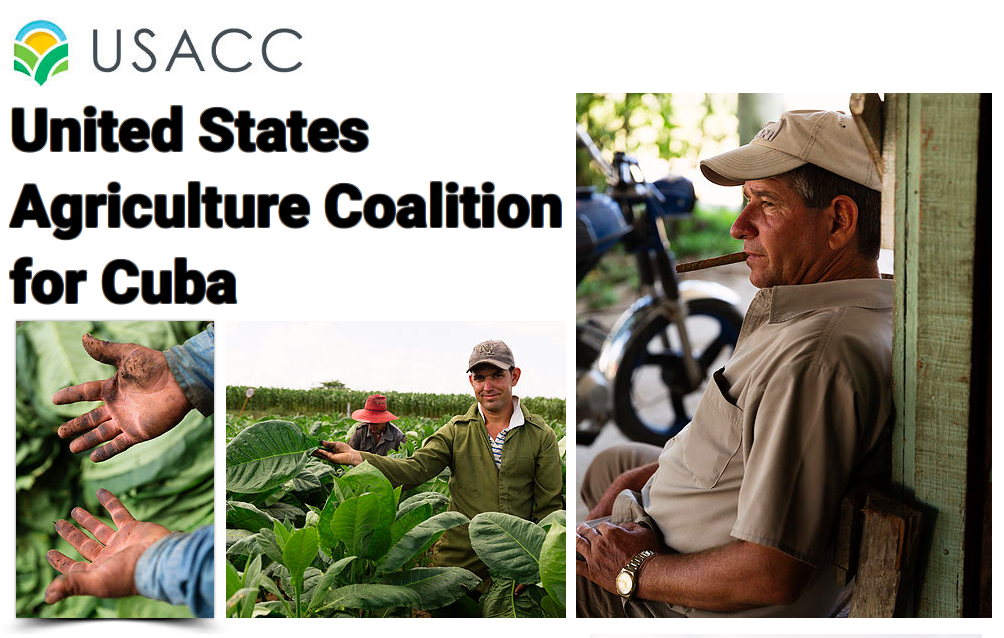
CUBA STANDARD — A coalition of 34 U.S. agribusiness companies and 74 agricultural associations urges the Trump administration not to allow claimants of confiscated properties in Cuba to file lawsuits in U.S. courts.
In an open letter to Secretary of Agriculture Sonny Perdue, the United Sates Agriculture Coalition for Cuba (USACC) warns that, if President Donald Trump fails to suspend Title III of the Helms-Burton Act on March 2, “an unnecessary flood of litigation” could “dash the export of U.S. food products to Cuba, harming American companies and the Cuban people who depend on these products”.
U.S. companies exported close to $230 million worth of agricultural goods to Cuba in 2018, down an estimated 18% from the year before.
“At a time when the need to develop new export markets is more important than ever, we urge you to work in strong support of U.S. agricultural producers seeking to expand our exports to Cuba,” the USACC says in its letter to Perdue, alluding to U.S. farm exports being hurt by the Trump administration’s trade wars.
Cuba has indemnified owners of properties confiscated after the revolution from all countries except the United States. Preliminary talks about settling U.S. claims began during the Obama years, but there has been no meeting since Donald Trump moved into the White House.
All presidents since Bill Clinton have routinely suspended Title III every six months, arguing it was in the national interest to avoid conflict with partner countries over Cuba. But now, Trump administration officials have threatened to activate the clause. In January — citing Cuba’s “indefensible support” for the governments of Venezuela and Nicaragua — Secretary of State Mike Pompeo suspended Title III for only 45 days.
“We encourage any person doing business in Cuba to reconsider whether they are trafficking in confiscated property and abetting this dictatorship,” a State Department statement said in January.
What’s at stake?
If the Trump administration does not suspend Title III on March 2, a large chunk of of U.S. nationals who hold 5,913 registered claims will be able to sue in U.S. courts, as will Cubans who left everything behind to emigrate here.
According to John Kavulich of the U.S.-Cuba Trade and Economic Council, 915 certified claimants would be eligible to file suit, based on minimum value provisions in U.S. laws.
It is impossible to estimate how many lawsuits would be filed by the two sets of plaintiffs, says Phil Peters, a Cuba observer and former State Department official. For one, Title III itself bars Cuban Americans from filing lawsuits over their former homes.
“But the number of lawsuits is not really the point – what matters is the cloud of uncertainty that the mere threat of litigation would cast over Cuba’s investment climate for years to come,” Peters wrote in a recent column for Cuba Standard.
Peters expects other U.S. trading partners to join Canada, Mexico, and Britain in enacting laws to block their companies from complying with any action resulting from the Helms-Burton law, and the European Union to revive its WTO action against Helms-Burton and to pursue its effort to create alternative international payments channels that have no connection to the United States banking system.
Export promotion
In the letter, the USACC also urges Perdue to enable federally funded export promotion for U.S. exports to Cuba, as budgeted in the recently passed farm bill.
“We hope that those funds will be fully implemented in 2019 for Cuba and allow us to both promote, educate, and carry out research that will help us to compete with existing countries currently exporting food to Cuba,” the letter says.
“Mr. Secretary, you well know that this is a time of turbulence in our agricultural export markets, and every market, no matter the size, is important. There is no reason for us not to increase substantially our market share in a neighboring country that imports $2 billion in food each year”, the letter ends.
The letter was signed by the following associations:
American Farm Bureau Federation
American Soybean Association
American Seed Trade Association
American Feed Industry Association
Association of Equipment Manufacturers
Cherry Marketing Institute
Corn Refiners Association
Council of State Governments
CNFA: Cultivating New Frontiers in Agriculture
Global Aquaculture Alliance
Independent Professional Seed Association
International Dairy Foods Association Matter
National Association of Wheat Growers
National Association of Egg Farmers
National Barley Growers Association
National Black Growers Council
National Chicken Council
National Corn Growers Association
National Council of Farmer Cooperatives
National Farmers Union
National Foreign Trade Council
National Grain and Feed Association
National Milk Producers Federation
National Oilseed Processors Association
National Potato Council
National Renderers Association
National Sorghum Producers
National Turkey Federation
North American Export Grain Association North American Meat Institute
Rural & Agricultural Council of America
Soyfoods Association of North America
USA Poultry & Egg Export Council
US Canola Association
US Cattlemen’s Association
US Dairy Export Council
US Dry Bean Council
US Grains Council
US Wheat Associates
US Rice Producers Association
USA Dry Pea & Lentil Council
USA Rice Federation
U.S. Agricultural Export Development Council
Agribusiness Council of Indiana Arkansas Rice Growers Association Arkansas Farm Bureau
California Rice Producers
Holstein Association USA
Illinois Corn Growers Association
Illinois Cuba Working Group Illinois Soybean Growers
Illinois Farm Bureau
Indiana Farm Bureau
Indiana Corn Growers Association
Indiana Soybean Alliance
Indiana Corn Marketing Council
Iowa Corn Growers Association
Iowa Farm Bureau
Kansas Wheat
Louisiana Rice Council
Michigan Apple Association
Michigan Bean Shippers
Michigan Bean Commission
Michigan Milk Producers Association
Michigan Corn Growers Association
Michigan Potato Industry Commission
Missouri Corn Growers Association
Missouri Soybean Association
Missouri Department of Economic Development
Missouri Rice Council
Missouri Forest Products Association
Missouri Farm Bureau
Mississippi Rice Council
Ohio Farm Bureau
Texas Farm Bureau
University of Missouri-Fisher Delta Research Center
Alcorn State University
Virginia Department of Agriculture and Consumer Services
Agriculture Corporations:
Advanced Drainage Systems AGCO
Bunge
Butterball
Cargill, Incorporated
Chicago Foods International
Campbell Farms
Clark AG Company
CoBank
Dairy Farmers of America
Franklin Electric
GreenStone Farm Credit Services
Hampton Alternative Energy & Feedlot
Hover Farms
Intertek Agriculture Services
Kaehler Agriculture Enterprises
Kerley Nutritional Consulting
Louis Dreyfus Company
Missouri BioZyme, Inc
Missouri Burnett Farms
Martin Rice Company
Michigan Allied Poultry Industries, Inc
Net Worth Feeds & Feeding
Orrick Farm Services
Gary Murphy Farms
Smithfield Foods
South Louisiana Rail Facility
Sun-Maid Growers of California
St. James Winery
Synergy Resource Solutions, Inc.
Thomas E. Jennings and Associates, Inc.
Turkey Knob Growers
TRC Trading Group
US Wellness Meats
US Cava Exports

